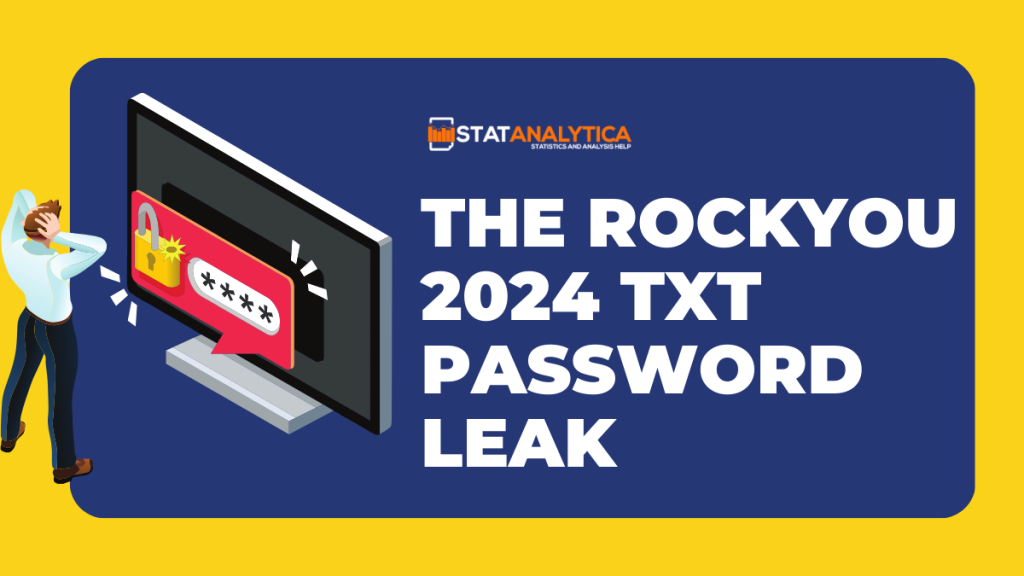In the world of cybersecurity, one of the biggest threats to our online safety is the leaking of passwords. Recently, a major password leak known as “RockYou2024” has taken the spotlight, posing significant risks to internet users worldwide. This blog aims to explain what rockyou 2024 txt password is, why it’s dangerous, and how you can protect yourself.

What is RockYou2024?
Table of Contents
The Origins of RockYou
To understand RockYou2024, we need to go back in time. In 2009, a company called RockYou, known for making social media apps and games, was hacked.
The attackers managed to steal over 32 million user passwords, which were then leaked online in a file called RockYou.txt.
This file contained a massive list of unencrypted (plain text) passwords, making it a goldmine for cybercriminals.
The Evolution to RockYou2024
Over the years, the name “RockYou.txt” has become synonymous with large-scale password leaks. In 2021, a new version called RockYou2021 emerged, containing over 8.4 billion passwords.
But now, in 2024, a hacker using the alias “ObamaCare” has released an even larger compilation, dubbed rockyou2024.txt. This file contains nearly 10 billion unique passwords, making it one of the largest password leaks in history.
What is RockYou.txt Used For?
Security engineers, penetration testers, and IT administrators use the RockYou.txt wordlist to assess network and system security.
It aids in cracking hashed passwords and identifying vulnerabilities, often employed with tools like John the Ripper or Hashcat for password-cracking exercises.
Rockyou 2024.txt downloadable from platforms like GitHub or Kaggle, it serves as a comprehensive dictionary of potential passwords for testing purposes.
Why is RockYou2024 Dangerous?
Scale of the Leak
The sheer number of passwords in the rockyou2024.txt file is staggering. With almost 10 billion passwords, it’s highly likely that many people’s passwords are included in this compilation.
This increases the risk of unauthorized access to numerous online accounts, from social media profiles to bank accounts.
Credential Stuffing Attacks
One of the main threats posed by such a large password list is the potential for credential stuffing attacks. In these attacks, cybercriminals use automated tools to try out large numbers of username and password combinations on various websites.
Because many people reuse passwords across different sites, this can lead to multiple accounts being compromised.
Example
Imagine there’s a student named Alex who uses the exact same password for their email, social media, and online shopping accounts.
If Alex’s password is included in the RockYou2024 leak, attackers could potentially access all these accounts simply by knowing Alex’s email address and the leaked password.
Brute-Force Attacks
Another problem is when hackers use really strong computers to try every single password until they find the right one.
With a list as extensive as RockYou2024, hackers have a ready-made resource of real-world passwords to test, making their job easier.
Real-World Impact of Rockyou 2024 Txt Password
- Previous Incidents: The RockYou2024 leak isn’t an isolated incident. In recent years, several high-profile companies have fallen victim to credential stuffing and brute-force attacks, resulting in significant data breaches. For example, companies like Santander, Ticketmaster, and Advance Auto Parts have faced security breaches due to similar attacks.
- Potential Future Attacks: With rockyou2024.txt now available to cybercriminals, we can expect an increase in such attacks. Any system that doesn’t have robust security measures in place is at risk. This includes not only websites but also other internet-connected devices like security cameras and industrial hardware.
How to Protect Yourself
Given the severity of the RockYou2024 leak, it’s crucial to take steps to protect yourself and your online accounts. Here are some practical tips:
- Update Your Passwords
The first and most important step is to change your passwords immediately, especially if you suspect they might be included in the RockYou2024 list. Create strong, unique passwords for each of your accounts.
Tips for Creating Strong Passwords:
- Use a combination of upper and lower case letters, numbers, and special characters.
- Avoid using easily guessable information like your name, birthdate, or common words.
- Aim for a minimum length of 12 characters.
- Use Multi-Factor Authentication (MFA)
Multi-factor authentication
Example:
- When you log into your email, you’ll enter your password and then receive a code on your phone that you must enter to complete the login process.
- Employ a Password Manager
Password managers can generate and store complex passwords for you, ensuring you don’t have to remember each one. They also help prevent password reuse, which is a common security mistake.
Popular Password Managers:
- LastPass
- Dashlane
- 1Password
- Regularly Check for Data Breaches
Use data breach search engines like BreachDirectory or Cybernews’ Leaked Password Checker to see if your information has been compromised in any known breaches. These tools can alert you if your email or other credentials have been exposed.
How to Use a Data Breach Search Engine:
- Go to the website of the search engine.
- Enter your email address or username.
- The tool will search its database and inform you if your information has been compromised.
- Implement Security Measures for Businesses
If you run a business, it’s essential to implement strong security measures to protect your users’ data. This includes using firewalls, monitoring for unusual activity, and training employees on cybersecurity best practices.
Key Business Security Measures:
- Enable brute-force defenses to block multiple failed login attempts.
- Regularly update software and systems to patch security vulnerabilities.
- Conduct security audits to identify and address potential weaknesses.
Conclusion
The RockYou 2024 txt password leak is a stark reminder of the importance of cybersecurity. With nearly 10 billion passwords exposed, the potential for damage is immense.
However, by taking proactive steps like updating your passwords, using multi-factor authentication, and employing password managers, you can significantly reduce your risk of falling victim to cyber attacks.
Remember, cybersecurity isn’t just about protecting your information; it’s about staying one step ahead of the hackers. Stay informed, stay vigilant, and stay safe online.


